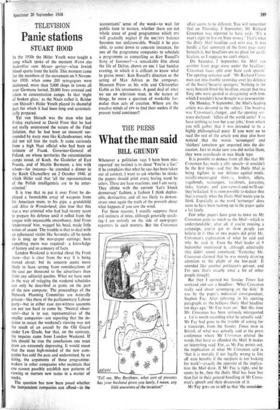Panic stations
TELEVISION STUART HOOD
In the 1930s the Hitler Youth were taught a song which spoke of the moment Wenn das Judenblut vom Messer spritzt—when Jewish
blood spurts from'the knife. This moment came for the members of the movement on 9 Novem- ber 1938, when some 200 synagogues were destroyed, more than 5,000 shops in towns all over Germany looted, 20,000 Jews arrested and taken to concentration camps. In that `night of broken glass,' as the Nazis called it, Baldur von Shirach's Hitler Youth played its shameful part for which it had been long and systemati- cally prepared.
Yet von Shirach was the man who last Friday explained to David Frost that he had
not really understood the nature of the Final Solution, that he had been an innocent sur- rounded by nasty men like Kaltenbrunner, who did not tell him the truth. It came curiously from a high Nazi official who had been an intimate of Frank, Governor-General of Poland, on whose territories the extermination camps stood, of Koch, the Gauleiter of East Prussia, and of Martin Bormann, a trio with
whom—for instance—he attended a dinner in the Reich Chancellery on 2 October 1940. at which Hitler said that 'all the representatives of the Polish intelligentsia are to be exter- minated.'
It is true that to put it over Frost he de- ployed a formidable array of weapons from
his American mum, to his pipe, a grandchild
and Alice in Wonderland; also true that this was a war criminal who had had twenty years
to prepare his defence until it rolled from the tongue with impeccable smoothness. And Frost `understood' him, wagged his head, made little noises of assent. The trouble is that to deal with an ephemeral victim like Savundra all he needs do is fling up the newspaper cuttings; here something more was required : a knowledge of history and an armoury of facts.
London Weekend is worried about the Frost show—that is clear from the way it is being moved about: but its concern seems more
likely to have sprung from considerations of the cost per thousand to the advertisers than
from any editorial qualms. What we have seen in the way of rejigging the weekend schedules can only be described as panic on the part of the new company. The proceedings of the Network Planning Committee are naturally private—like those of the parliamentary Labour party—but in either case eye-witness accounts are not too hard to come by. 'Neutral obser- vers'—that is to say, representatives of the smaller companies—are reporting that the de- cision to recast the weekend's viewing was not the result of an assault by the Old Guard under Lew Grade, but that, on the contrary, the impetus came from London Weekend. If this should be true the conclusions one must draw are extremely depressing. It would mean that the most high-minded of the new com- panies has sold the pass and undermined, by so doing, the arguments of those programme- makers in other companies who maintain that one cannot possibly establish new patterns of viewing or nurture new tastes in a matter of weeks.
The question has now been posed whether the independent companies can afford—in. the
accountants' sense of the word—to wait for public taste to mature, whether there are not whole areas of good programmes which ITV will gradually neglect if the Bac/my balance becomes too unfavourable. Would it be pos- sible, to come down to concrete instances, for one of the programme companies to schedule a programme as compelling as Ken Russell's Song of Summer?—a remarkable film about the life of Delius, shown on sac 1 last Sunday evening, in which it is difficult to know what to praise most: Ken Russell's direction or the acting of Max Adrian as the composer, Maureen Pryor as his wife and Christopher Gable as his amanuensis. A good deal of what we see on television must, in the nature of things, be more a question of workable for- mulae than acts of creation...Where are the creative minds of try to find their outlets if the present trend continues?










































 Previous page
Previous page